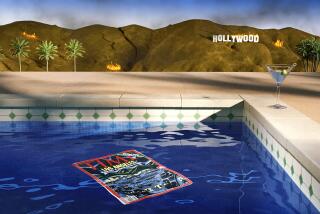Black anger and the Big Easy
‘WE HAD AN incredible Mardi Gras season,” said C. Ray Nagin, the mayor of New Orleans, at a news conference Monday. In the city’s second celebration since Hurricane Katrina, he said, hotels and restaurants were full and the parades were well attended. His message was clear: New Orleans is back.
To me, however, his enthusiasm feels premature. Almost a year and a half after the flood left much of the city in a state of destitution that feels increasingly permanent, I wonder how much more of this we should take. By “we,” I am referring to the national black body politic, and by “this,” I mean the survival mentality of black New Orleanians, who have displayed an extraordinary but distressing forbearance.
Coping with tragedy that is often caused by racism is necessary, of course, and practically a way of life for African Americans. But this way of life needs to change. Black people need to stay on the offensive by staying mad when appropriate. And few moments in the last decade have been as appropriate as the aftermath of the catastrophic flood caused by broken levees in New Orleans.
We had it right at first -- the public indignation over being called citizen “refugees,” the vocal disgust with lackadaisical and bureaucratic responses to Katrina by all levels of government, the unguarded Kanye West moment. But the righteous anger was short-lived.
The big discussion leading up to Mardi Gras was not about New Orleans’ still-bleak and uncertain landscape but whether the hotels around the flood-spared French Quarter would be filled. The fact that they were seemed to settle the question about whether New Orleans was coming back. That whole neighborhoods much larger than the Quarter face a predicament far more grave than hotel occupancy rates seems to have escaped everyone’s notice.
Part of the problem is the breathless pace of news coverage and ever-shorter story cycles. But part is the unwillingness, or the inability, of blacks to keep the pressure up. The reasons include a lack of leadership, a surplus of crises and fear of being cast as victims -- or, worse yet, as angry black folk.
America is leery of angry black folk. (The exception is when the anger is pre-approved or contained by performance, as in hip-hop or sports.) The impossible task for blacks these days is to get mad and get broader support, something that hasn’t happened since the ‘60s.
In 21st century America, empathy seems to be reserved for the heroic and the stoic, those who give all and ask for nothing. Perseverance is what the nation seems to most admire in black folk, if it admires anything: the poetic but passive stuff celebrated in spirituals, blues songs and church hymns. In New Orleans, that has translated into admiration for the man who rescued his neighbor from a rooftop or for the family determined to return and rebuild, government help or no.
Anger is the province of criminals and complainers, which is pretty much how the country eventually came to view the hordes of dirty, desperate folks warehoused in the Superdome and Astrodome who had the temerity to be upset about it. Barbara Bush spoke for more people than herself when she opined that evacuees in Houston were doing better because they were probably “underprivileged anyway.” What earthly right had they to be angry?
Compounding the problem is a tendency for blacks first and foremost to persevere because they have had to, because so often when disasters strike their community -- riots, drugs, displacement -- they have no option but to keep on keeping on. New Orleans especially is a city steeped in that tradition, a place where jazzmen learned to turn funeral dirges into flat-out celebrations.
Much was made of that high-stepping, can-do spirit after the flood -- too much. How much easier it was to go straight to the romance of recovery, of “healing,” than to focus on the unromantic problems at hand. Easier to think of New Orleans not as a homeland for blacks who’d known no other place but as a town that was now unfit for those same black folks. They would simply have to find another home.
In so many ways, we believe there is no continuity to the black story in America, and therefore nothing is ever at stake. Price Cobbs, coauthor of the seminal 1960s book “Black Rage,” wrote a memoir in 2005 in which he declared that it was time for black Americans to finally claim a sense of entitlement. He meant not government handouts or racial exceptionalism but full participation in the whole entitlement culture that stresses an individual’s inalienable right to be satisfied and listened to.
It is a decidedly self-centered view, but one that blacks as a group could use more of. Our survival -- and that of New Orleans -- depends on it.
More to Read
Sign up for Essential California
The most important California stories and recommendations in your inbox every morning.
You may occasionally receive promotional content from the Los Angeles Times.










